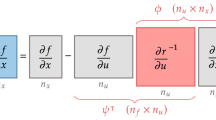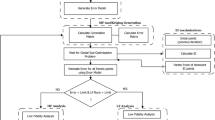Abstract
Multifidelity design optimization is a strategy that can reduce the high computational cost in cases where the high-fidelity model is too expensive to use directly in optimization. However, current multifidelity approaches cannot handle the high-dimensional problems commonly encountered in industrial settings. Furthermore, they cannot accommodate arbitrary analysis fidelities, directly handle multidisciplinary problems, or provably converge to the high-fidelity optimum. In this paper, we present a practical multifidelity approach that leverages the advantages of conventional gradient-based approaches. Rather than constructing a multifidelity surrogate, we perform a sequence of single-fidelity gradient-based optimizations. The framework determines the appropriate fidelity and updates it during the optimization process. Finally, we demonstrate the proposed approach on a multipoint aerostructural wing optimization problem with over a hundred design variables. The multifidelity approach reduces the computational cost by 59% compared to the high-fidelity approach while obtaining the same numerical optimum.















Similar content being viewed by others
References
Alexandrov NM, Lewis RM, Gumbert CR, Green LL, Newman PA (2001) Approximation and model management in aerodynamic optimization with variable-fidelity models. J Aircr 38(6):1093–1101. https://doi.org/10.2514/2.2877
Allaire D, Willcox K (2014) A mathematical and computational framework for multifidelity design and analysis with computer models. Int J Uncertain Quantif 4(1):1–20. https://doi.org/10.1615/Int.J.UncertaintyQuantification.2013004121
Bons NP, Martins JRRA (2020) Aerostructural design exploration of a wing in transonic flow. Aerospace 7(8):118. https://doi.org/10.3390/aerospace7080118
Brooks TR, Kennedy GJ, Martins JRRA (2017) High-fidelity multipoint aerostructural optimization of a high aspect ratio tow-steered composite wing. In: Proceedings of the 58th AIAA/ASCE/AHS/ASC structures, structural dynamics, and materials conference, AIAA SciTech Forum, Grapevine, TX, https://doi.org/10.2514/6.2017-1350
Brooks TR, Kenway GKW, Martins JRRA (2018) Benchmark aerostructural models for the study of transonic aircraft wings. AIAA Journal 56(7):2840–2855. https://doi.org/10.2514/1.J056603
Bryson DE, Rumpfkeil MP (2018) Multifidelity quasi-Newton method for design optimization. AIAA J 56(10):4074–4086. https://doi.org/10.2514/1.J056840
Bryson DE, Rumpfkeil MP (2019) Aerostructural design optimization using a multifidelity quasi-Newton method. J Aircr 56(5):2019–2031. https://doi.org/10.2514/1.C035152
Chen G, Fidkowski KJ (2019) Discretization error control for constrained aerodynamic shape optimization. J Comput Phys 387:163–185. https://doi.org/10.1016/j.jcp.2019.02.038
Choi S, Alonso JJ, Kroo IM, Wintzer M (2008) Multifidelity design optimization of low-boom supersonic jets. J Aircr 45(1):106–118. https://doi.org/10.2514/1.28948
Drela M (1989) XFOIL—An analysis and design system for low Reynolds number airfoils. In: Low Reynolds number aerodynamics, Notre Dame, Germany, Federal Republic of
Elham A, van Tooren MJ (2017) Multi-fidelity wing aerostructural optimization using a trust region filter-SQP algorithm. Struct Multidisc Optim 55(5):1773–1786. https://doi.org/10.1007/s00158-016-1613-0
Forrester AI, Bressloff NW, Keane AJ (2006) Optimization using surrogate models and partially converged computational fluid dynamics simulations. Proc R Soc 462(2071):2177–2204. https://doi.org/10.1098/rspa.2006.1679
Gill PE, Murray W, Saunders MA (2005) SNOPT: an SQP algorithm for large-scale constrained optimization. SIAM Rev 47(1):99–131. https://doi.org/10.1137/S0036144504446096
Giselle Fernández-Godino M, Park C, Kim NH, Haftka RT (2019) Issues in deciding whether to use multifidelity surrogates. AIAA J 57(5):2039–2054. https://doi.org/10.2514/1.j057750
Gratton S, Sartenaer A, Toint PL (2008) Recursive trust-region methods for multiscale nonlinear optimization. SIAM J Optim 19(1):414–444. https://doi.org/10.1137/050623012
Haftka RT (1977) Optimization of flexible wing structures subject to strength and induced drag constraints. AIAA J 15(8):1101–1106. https://doi.org/10.2514/3.7400
Kennedy GJ, Martins JRRA (2014) A parallel finite-element framework for large-scale gradient-based design optimization of high-performance structures. Finite Elements Anal Des 87:56–73. https://doi.org/10.1016/j.finel.2014.04.011
Kenway GK, Kennedy GJ, Martins JRRA (2010) A CAD-free approach to high-fidelity aerostructural optimization. In: Proceedings of the 13th AIAA/ISSMO multidisciplinary analysis optimization conference, Fort Worth, TX, AIAA 2010-9231, https://doi.org/10.2514/6.2010-9231
Kenway GKW, Martins JRRA (2014) Multipoint high-fidelity aerostructural optimization of a transport aircraft configuration. J Aircr 51(1):144–160. https://doi.org/10.2514/1.C032150
Kenway GKW, Kennedy GJ, Martins JRRA (2014) Scalable parallel approach for high-fidelity steady-state aeroelastic analysis and adjoint derivative computations. AIAA J 52(5):935–951. https://doi.org/10.2514/1.J052255
Koziel S, Leifsson L (2013) Multi-level CFD-based airfoil shape optimization with automated low-fidelity model selection. Procedia Comput Sci 18:889–898. https://doi.org/10.1016/j.procs.2013.05.254
Lambe AB, Martins JRRA (2012) Extensions to the design structure matrix for the description of multidisciplinary design, analysis, and optimization processes. Struct Multidisc Optim 46:273–284. https://doi.org/10.1007/s00158-012-0763-y
Lambe AB, Martins JRRA, Kennedy GJ (2017) An evaluation of constraint aggregation strategies for wing box mass minimization. Struct Multidisc Optim 55(1):257–277. https://doi.org/10.1007/s00158-016-1495-1
Leifsson L, Koziel S (2010) Multi-fidelity design optimization of transonic airfoils using physics-based surrogate modeling and shape-preserving response prediction. J Comput Sci 1(2):98–106. https://doi.org/10.1016/j.jocs.2010.03.007
Levy D, Laflin K, Vassberg J, Tinoco E, Mani M, Rider B, Brodersen O, Crippa S, Rumsey C, Wahls R, Morrison J, Mavriplis D, Murayama M (2013) Summary of data from the fifth AIAA CFD drag prediction workshop. In: 51st AIAA aerospace sciences meeting including the new horizons forum and aerospace exposition. https://doi.org/10.2514/6.2013-46
Lyu Z, Kenway GKW, Martins JRRA (2015) Aerodynamic shape optimization investigations of the Common Research Model wing benchmark. AIAA J 53(4):968–985. https://doi.org/10.2514/1.J053318
Mader CA, Kenway GKW, Yildirim A, Martins JRRA (2020) ADflow: an open-source computational fluid dynamics solver for aerodynamic and multidisciplinary optimization. J Aerosp Inf Syst 17(9):508–527. https://doi.org/10.2514/1.I010796
March A, Willcox K (2012) Provably convergent multifidelity optimization algorithm not requiring high-fidelity derivatives. AIAA J 50(5):1079–1089. https://doi.org/10.2514/1.J051125
Martins JRRA, Lambe AB (2013) Multidisciplinary design optimization: a survey of architectures. AIAA J 51(9):2049–2075. https://doi.org/10.2514/1.J051895
Martins JRRA, Alonso JJ, Reuther JJ (2005) A coupled-adjoint sensitivity analysis method for high-fidelity aero-structural design. Optim Eng 6(1):33–62. https://doi.org/10.1023/B:OPTE.0000048536.47956.62
Morgado J, Vizinho R, Silvestre MAR, Páscoa JC (2016) XFOIL vs CFD performance predictions for high lift low Reynolds number airfoils. Aerosp Sci Technol 52:207–214. https://doi.org/10.1016/j.ast.2016.02.031
Nguyen N-V, Choi S-M, Kim W-S, Lee J-W, Kim S, Neufeld D, Byun Y-H (2013) Multidisciplinary unmanned combat air vehicle system design using multi-fidelity model. Aerosp Sci Technol 26(1):200–210. https://doi.org/10.1016/j.ast.2012.04.004
Nocedal J, Wright SJ (2006) Numerical optimization, 2nd edn. Springer, Berlin
Olivanti R, Gallard F, Brézillon J, Gourdain N (2019) Comparison of generic multi-fidelity approaches for bound-constrained nonlinear optimization applied to adjoint-based CFD applications. In: AIAA Aviation 2019 Forum. https://doi.org/10.2514/6.2019-3102
Peherstorfer B, Willcox K, Gunzburger M (2018) Survey of multifidelity methods in uncertainty propagation, inference, and optimization. SIAM Rev 60(3):550–591. https://doi.org/10.1137/16M1082469
Secco N, Kenway GKW, He P, Mader C, Martins JRRA (2021) Efficient mesh generation and deformation for aerodynamic shape optimization. AIAA J 59(4):1151–1168. https://doi.org/10.2514/1.J059491
Viana FAC, Simpson TW, Balabanov V, Toropov V (2014) Metamodeling in multidisciplinary design optimization: How far have we really come? AIAA J 52(4):670–690. https://doi.org/10.2514/1.J052375
Wu N, Kenway G, Mader CA, Jasa J, Martins JRRA (2020) pyOptSparse: a Python framework for large-scale constrained nonlinear optimization of sparse systems. J Open Source Softw 5(54):2564. https://doi.org/10.21105/joss.02564
Yu Y, Lyu Z, Xu Z, Martins JRRA (2018) On the influence of optimization algorithm and starting design on wing aerodynamic shape optimization. Aerosp Sci Technol 75:183–199. https://doi.org/10.1016/j.ast.2018.01.016
Acknowledgements
This work was supported by Airbus in the frame of the Airbus–Michigan Center for Aero-Servo-Elasticity of Very Flexible Aircraft. Special thanks to Anne Gazaix, Tom Gibson, and Joel Brezillon for their expert advice and review of this paper. Additionally, the authors would like to thank Philip Gill and Elizabeth Wong for their assistance and insightful discussions regarding SNOPT. This research was partly supported through computational resources and services provided by Advanced Research Computing at the University of Michigan, Ann Arbor.
Author information
Authors and Affiliations
Corresponding author
Ethics declarations
Conflicts of Interest
The authors declare that they have no conflict of interest.
Replication of Results
The optimization uses MACH, of which several modules are available on GitHub under open source licenses. However, the multifidelity code is not yet available due to IP restrictions.
Additional information
Responsible Editor: Erdem Acar.
Publisher's Note
Springer Nature remains neutral with regard to jurisdictional claims in published maps and institutional affiliations.
Rights and permissions
About this article
Cite this article
Wu, N., Mader, C.A. & Martins, J.R.R.A. A Gradient-based Sequential Multifidelity Approach to Multidisciplinary Design Optimization. Struct Multidisc Optim 65, 131 (2022). https://doi.org/10.1007/s00158-022-03204-1
Received:
Revised:
Accepted:
Published:
DOI: https://doi.org/10.1007/s00158-022-03204-1




